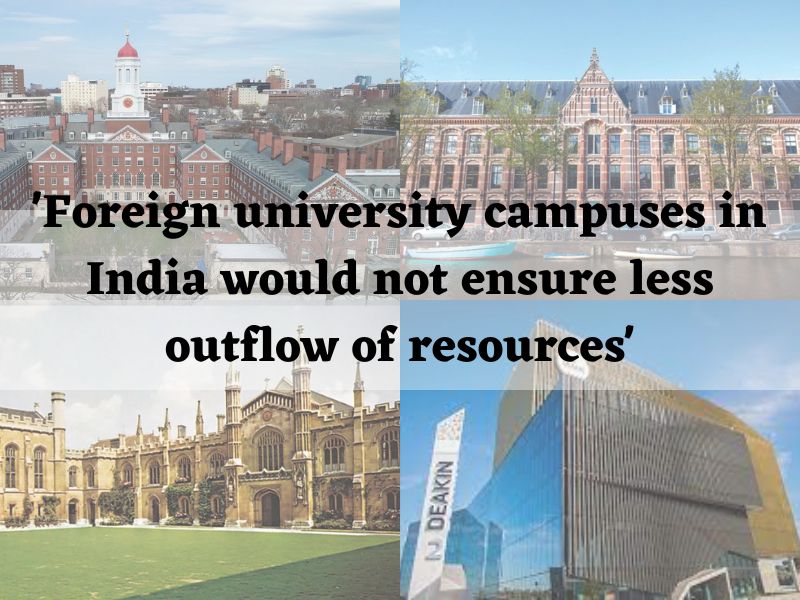-Shreyosi Chakraborty
With India witnessing a huge upsurge in the number of students flying abroad for studies, the University Grant Commission’s move to welcome foreign universities to set up campuses in India might be appreciated yet it is an uncertain and indistinct one with ‘neutral’ feedbacks from educationists. The University Grants Commission (UGC) unveiled the draft norms last month for allowing foreign universities to set up campuses in India with autonomy to decide the admission procedure and fees structure.
Compared to last five years, around 7.5 lakh students flew abroad on student visas in 2022, according to a data from the Bureau of Immigration (BoI).
Whereas the Union government came up with a solution of providing higher education and research services to compete with international standards and also control the resources outflow, there are various factors that needs to be highlighted.
Number of students flying abroad to go up further
The students who aim to study in India’s private colleges will benefit from this as there will be more college options to choose from. They will also avail benefits of a better curriculum and teaching methodology. It will, however, not impact the students who plan to study overseas, says Piyush Kumar, regional director- South Asia and Mauritius, IDP Education. He further adds, those who plan overseas education are not only looking for superior quality education and faculty but also to experience growth and development by learning to adapt to a multicultural environment in a different country.
Commenting on if the establishment of foreign varsities in India would ensure less outflow of resources, Kumar further said, “India makes up the largest population when it comes to studying abroad, and by 2024, the number of Indian students studying abroad is likely to go up to 1.8 million. Foreign varsities setting up campuses in India will not impact the rising number of Indian students going overseas, as apart from great colleges, an advanced curriculum, faculties, and multicultural environment, studying abroad allows easy access to international work exposure since most countries have lucrative Post-Study Work Rights (PSWR). Many people who study abroad also end up either staying permanently or for a considerable period in those countries. These things will not be possible if a student studies in a foreign university campus set up in India. From getting exposure to different cultures and languages, better career opportunities and professional network and international recognition, the experience of studying abroad cannot be replaced.”
Dr. Pragna Rao, pro vice-chancellor, Manipal Academy of Higher Education (MAHE), Bengaluru Campus is also of the opinion that those students who are fixated on studying overseas will not be affected because they aim at a various factors like quality of education, faculty, multicultural background, work benefits, etc. She further adds, “The UGC’s decision to allow foreign universities to open campuses in India has multiple tenets to it. It will provide students who were aspiring to go abroad, a cost effective opportunity to study at these universities. An alternate approach to this is affiliations between Indian colleges and international universities. A classic example of this is our Manipal Academy of Higher Education affiliated American University of Antigua, which provides a more affordable alternative to students compared to other local universities in the region.”
According to the Supreme Court of India, “Education is not the business to earn profit. The tuition fee shall always be affordable.” It prohibits profit-making in providing educational services to the country. The draft guidelines too do not necessarily throw any light on providing a financial support to the varsities for setting up campuses. Even though foreign universities will be allowed to charge any amount of tuition and other fees, generating profits in India would be seen as a challenge as the Supreme Court does not allow education to flourish as a business for profit. The fact that the government has not put any restriction on tuition fees, however, it has said that a ‘reasonable fee’ can be charged. This is very vague. Potentially, in this case the UGC could become the regulatory authority on this critical issue which further could be a potential dealbreaker for many foreign universities. Many universities too would want to know about their profits and the fund remittances.
Prof. Ian Martin, vice chancellor, Deakin University, Australia, however, had a positive outlook as he looks forward for new ways of building partnerships beyond what they already have got. “If you look at the hubs or a lot of the programs that Deakin University has in India, we can now do more of those. Building campuses here is making the best of the opening up as it enables us to do more of ‘In India, With India’. So far, we have been able to do the ‘With India’ really well, now we can do the ‘In India’ really well, added he.
Practical challenges of establishing foreign varsity campuses in India
Bhaskar Chakravorti, Dean of Global Business at The Fletcher School at Tufts University while acknowledging the move, highlighted the challenges. “The biggest challenge is the shortage of qualified faculty. I would imagine the international institutions will fly in faculty from abroad and hire local instructors, but it will remain a relatively shallow pool to draw from. The second is to work collaboratively with and avoid interference on content, curriculum, academic standards and hiring issues from local governments and regulators.”
Indian students will benefit from the quality and standards introduced by foreign universities setting up campuses in India. The country has arguably the largest learner community in the world and the number of academic institutions is woefully small – and quality institutions even smaller given the size of the demand and the country’s need. For so many students, the expenses of traveling and living abroad puts such an education out of reach. Foreign university campuses will lead to an explosion in learning and raise the bar on the quality of education across the board, said he.
Also Read:Foreign universities setting up campuses in India: An explainer
